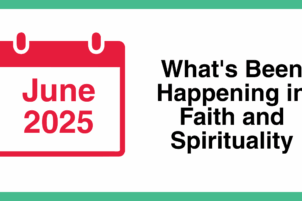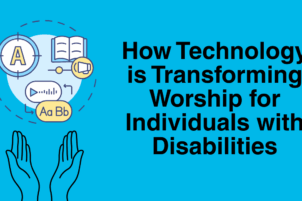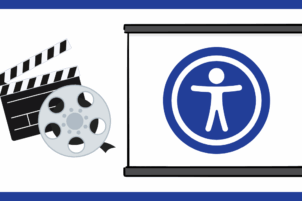Short film series explores the intersection of disability and prayer in the Jewish community
Los Angeles, May 13, 2021 – Ariella Barker, an attorney, policy advisor, and communication specialist who was diagnosed with Spinal Muscular Atrophy, stars in her own segment of “What Do You Pray For?” The film was made by Ben Rosloff, a talented emerging filmmaker on the Autism spectrum who serves as a Jewish Inclusion Fellow in RespectAbility’s National Leadership Program.
”What Do You Pray For?” is a series of short interviews of Jews with disabilities who tell viewers in their own words what they pray for and what prayer means to them. The project features Jews with various disabilities from across the United States, with a myriad of different connections to their Jewish identity.
The series focuses on the universal nature and themes of prayer, as well as the hopes and dreams of people with disabilities. The interviews reveal the need for inclusion and a connection to the community. All interviewees provided valuable insights on their disability experience, understanding it to be an integral part of themselves, presenting challenges and opportunities.
Ariella Barker is a former communications fellow and a member of the National Disability Speakers Bureau at RespectAbility. She has a BBA and JD from Emory University Goizueta Business School and an MPA from the Harvard Kennedy School, where she was a John F. Kennedy Fellow on a full merit scholarship. She has worked internationally across the public, social and private sectors, fiercely advocating for her clients and communities in the areas of employment discrimination issues, antisemitism and disability rights.
She communicates with and reports on political campaigns for the President of the United States, Congress and Gubernatorial races regarding disability issues. She also works to improve disability inclusion and perception in the Jewish Community.
Barker was diagnosed with Spinal Muscular Atrophy at the age of three and lost the ability to walk at the age of eleven, the same year the Americans with Disabilities Act went into effect. Living in an inaccessible world as a wheelchair-user, she quickly became a disability advocate to accomplish her own American Dream. From her public-school system and small hometown, her university and law school, to NYC courthouses and Israeli coffee houses, she paved an accessible path to the future.
After law school, Barker was an Assistant Corporation Counsel for the City of New York and Mayor Michael Bloomberg, where she defended high-profile constitutional, employment discrimination and labor law claims. As a result of her work, policy within the City changed.
In 2008, Barker emigrated to Israel. She continued working as an attorney, while advocating for Israelis with disabilities to have a more accessible State. She sat on accessibility committees, wrote op-eds for the Jerusalem Post, and encouraged various entities to make their properties accessible. As a result of her advocacy, many private businesses, synagogues and government properties became accessible. In 2011, she was named one of Israel’s top 50 bachelorettes.
In 2012, Barker returned to the States for medical treatment and family support due to the onset of chronic illness. In battling chronic illness compounded with disability, she learned how impossible it is for Americans with severe or multiple disabilities to access healthcare, gain employment or simply live with dignity. It was this realization that convinced her to leave the practice of law and enter the world of disability policy.
In 2014, Barker was crowned Ms. Wheelchair North Carolina, a disability advocacy position. As part of her role as Ms. Wheelchair NC, she encouraged producers and major television networks to accurately depict characters with disabilities on television and film. Since then, she has traveled the country, speaking about disability inclusion and rights. In 2016, she began advising politicians on disability issues. And she has published articles on disability issues in The Charlotte Observer, The Jerusalem Post, Garnet News, Push Living, Daily Kos, Grok Nation, Kol Ha’Birah, The Mighty and others.
Barker is the child of an immigrant and a first-generation college graduate. She grew up in rural North Carolina, but she has lived in Atlanta, New York City, and even overseas in Nigeria and Israel. She carried the 1996 Paralympic Torch, modeled for Permobil and has been the subject of several documentaries and news articles.
Barker is also an Orthodox Jewish convert, devout Zionist and a dual American Israeli citizen, who is fluent in English and Hebrew. She loves to cook for and host large Shabbat dinner parties, where traditional Cholent and gefilte fish are replaced with soul food and tacos. She educates the Jewish community and prospective converts on the challenges of living as a convert, from discrimination in marriage and immigration to the struggles of isolation and the difficulty of teaching a non-Jewish grandmother the laws of keeping kosher. And she works with non-Jewish communities in understanding the insular Jewish community, Zionism and the need for a Jewish State, in hopes of lessening the current rise of antisemitism.
A transcript of the film is below:
Benjamin Rosloff: My name is Benjamin Rosloff, and I am a filmmaker, editor, and storyteller. And I am living with autism. There are different types of prayers; prayers that praise God, prayers that thank God, prayers that ask for forgiveness, and prayers that ask God for something. There are prayers that are memorized that we recite or sing to familiar melodies. Asking questions is how we learn about people’s hopes and dreams and what kind of world they want to live in.
Hello, this is Ariella Barker, she is a wheelchair user, and an attorney for the city of New York.
Ariella Barker: Thanks so much for having me Ben.
Rosloff: Do you pray?
Barker: I do sometimes, it depends on the circumstance.
Rosloff: Do you recite prayers that you have learned or memorized, or do you have personal prayers?
Barker: I grew up as a non-Jew, and so did not grow up with recited prayers of any kind, but later in life, when I converted to be an Orthodox Jew, I learned all the recited prayers, but also, I carried along the personal prayers that I learned as a child.
Rosloff: Is your disability something you refer to in your prayers?
Barker: It used to be a lot more, now today, I don’t pray for healing, I will pray for continued health, and I actually typically choose not to be on a Mi Sheberach list for example, because I don’t like to refer to my disability or think of myself as perpetually ill.
Rosloff: How does praying make you feel?
Barker: On the high holidays, I get very emotional. The beautiful, singing, and tunes, of the prayers makes me like this. So, when I’m in a congregation, especially on those high holy days, and I’m surrounded by the community. It makes me feel closer to God and emotional.
Rosloff: Do you think people with disabilities prayers are different than prayers of non-disabled people?
Barker: I think the things that people with disabilities do are no different than the things that non-disabled people do, and that includes prayer. In general, people pray for the same things, and that’s to be loved and accepted to be able to have purpose in life, and that is the same whether you have a disability or you don’t.
Rosloff: What do you pray for?
Barker: What I pray for has changed a lot in my life. I used to pray for healing, I used to pray for marriage, I used to pray for family, I now pray for continued health, happiness, and the ability to have purpose and the ability to fulfill the mitzvot.
Rosloff: Judaism encourages questions. It is how we learn, how we grow, and how we gain an understanding of ourselves, and our relationship to God.
The individuals featured in the “What Do You Pray For” series include:
- Erika Abbott: Writer / Award-Winning Poet
- Ariella Barker: Attorney, Policy Advisor and Communications Specialist
- Justin Borses: Former College Student and employee at Moorpark College
- Lee Chernotsky: Founder and CEO, ROSIES Foundation
- Samantha Elisofon: Award-Winning Actress (“Keep the Change”) and member of EPIC Players, A Neuro-inclusive Theater Company in Brooklyn
- Alex Howard: Entertainment Media and Jewish Inclusion Fellow in RespectAbility’s National Leadership Program
- Matan Koch: Director of RespectAbility California and Jewish Leadership
- Amy Rosenfeld-Kass: Teacher from The Saul and Carole Zabar Nursery School at the JCC
- Ben Rosloff: Communications and Jewish Inclusion Fellow in RespectAbility’s National Leadership Program
- Rachel Rothstein: 4th year Rabbinical Student at the Hebrew Union College Jewish Institute of Religion
- Barry Shore: Ambassador of Joy and Successful Serial Entrepreneur
- Ari Sloan: Member of EPIC Players who is living with Autism
- Joshua Steinberg: Program Associate for RespectAbility California and Jewish Leadership
- Dr. Brendan Stern: Assistant Professor of American politics and the Executive Director of the Center for Democracy in Deaf America at Gallaudet University
- Rabbi Lauren Tuchman: Rabbi, Public Speaker, Spiritual Leader and Educator
- Blair Webb: System Change Youth Advocate at MEET THE BIZ and former Jewish Inclusion Fellow in RespectAbility’s National Leadership Program
- Aaron Wolf: Co-founder of Howling Wolf Productions and Award-winning Actor, Director, Speaker, and Activist
Rosloff, a filmmaker who is active in Jewish life and has been to Israel, grew up in Great Neck, NY and earned a BFA in Electronic Media from Long Island University. He has produced films for a variety of organizations, including his documentary short “Can I Call You?!” screened in the United States and Russia during an internship with Downtown Community Television Center. Rosloff also has co-produced, edited and screened multiple films for the United Nations. These include a film for World Autism Awareness Day, where Rosloff interviewed then-Secretary General Ban-Ki Moon, as well as “#Envision 2030” for Disability Awareness Day. Rosloff currently is looking for a job in video production and/or editing. His LinkedIn is https://www.linkedin.com/in/benjamin-rosloff-95324011a. You can reach him via Benjamin.Rosloff@gmail.com.
About RespectAbility: RespectAbility is a nonprofit organization that fights stigmas and advances opportunities so people with disabilities can fully participate in all aspects of community. Founded by members of the Jewish Funders Network, it is the world’s largest nonprofit one-stop-shop on Jewish disability inclusion. RespectAbility knows that people with disabilities and their families have the same hopes and dreams as everyone else. www.respectability.org, www.respectability.org/resources/faith-inclusion







